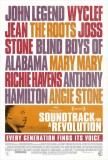| Reviews & Columns |
|
Reviews DVD TV on DVD Blu-ray 4K UHD International DVDs In Theaters Reviews by Studio Video Games Features Collector Series DVDs Easter Egg Database Interviews DVD Talk Radio Feature Articles Columns Anime Talk DVD Savant Horror DVDs The M.O.D. Squad Art House HD Talk Silent DVD
|
DVD Talk Forum |
|
|
| Resources |
|
DVD Price Search Customer Service #'s RCE Info Links |
|
Columns
|
|
|
Soundtrack for a Revolution
"It was the music that created a sense of solidarity." Those words come early in Soundtrack for a Revolution, and they form the somewhat tenuous connection between the two halves of Bill Guttentag and Dan Sturman's film. Like Standing in the Shadows of Motown, it is a hybrid of historical documentary and modern performance film, with icons like Julian Bond, Ambassador Andrew Young, and Congressman John Lewis telling the story of the civil rights movement while artists like John Legend, The Roots, and Blind Boys of Alabama perform the songs that defined the time. They don't quite manage to pull it all together--the documentary segments barely skim the surface of this story, while the music is hit and miss--but it is a passionate film with an important story to tell.
Its streamlined approach to the history of the civil rights movement sometimes amounts to a "greatest hits" approach, with only the most familiar signposts of the era visited, and then sometimes only briefly: the Montgomery bus boycott, the lunch counter sit-ins, the Freedom Riders, the Birmingham jailings, the March on Washington, the Missippi murders, the death of Medgar Evers, the Selma voting protests, Bloody Sunday. The reminisces of those who were there are unquestionably valuable, and there are many fascinating memories; I particularly enjoyed Lewis' opening remarks about how "the first time I got arrested, I felt so free," as well as the story about Dr. King's reaction to hearing LBJ state that "we shall overcome" in his civil rights address to Congress.
The only trouble is that so much of this material has been covered, with greater depth and insight, in countless other, better documentaries, from Eyes on the Prize to 4 Little Girls to Tom Brokaw's recent (and excellent) King TV documentary. Much of the archival footage is powerful (I'll never get numb to that shocking film of Bloody Sunday), but it's almost entirely clips we've seen countless times before.
The film's other flaw is that it can't quite thread its theme into the narrative in a compelling way; the idea of telling the story through the music seems like an afterthought, an obligation to attend to whether it is organic or not, and the new musical performances sometimes stop the movie cold. Joss Stone, for instance, is a fine singer and an able performer, but her take on "Eyes on the Prize" is all wrong; she performs it like some kind of a slinky sex kitten, and her over-singing approaches Mariah Carey territory. Other songs, performed by The Carlton Reese Memorial Unity Choir, go too far in the other direction towards the rote and uninspired. And I'd not heard of Mary & Mary before this film, but after their forgettable performance, I'm not too worried about it.
Some of the other performances are memorable. Wyclef Jean's number is elegant and polished, while Richie Havens' simple, direct, and moving take on "Will The Circle Be Unbroken" (accompanying heartbreaking pictures of those who were shot, beaten, lynched, drowned, and bombed--some you've heard of, many you haven't) brings tears to the eye. The Roots' rendition of "Ain't Gonna Let Nobody Turn Me Around" is evocative and brilliant (seriously, what can't these guys do?). And John Legend's rich, pure voice is exactly the right one to accompany the footage of Dr. King's funeral procession.
There's not much in Soundtrack for a Revolution that's new to those who have studied the period or have seen other, superior docs on the movement. But its accessibility and brevity, and the hook of the performances, could make it an easier sell to younger and less informed audiences. I wouldn't be surprised if it ends up playing in a lot of high school history classes--and let's be honest, that's not a bad fate for a documentary these days.
Jason lives in New York. He holds an MA in Cultural Reporting and Criticism from NYU.
|
| Popular Reviews |
| Sponsored Links |
|
|
| Sponsored Links |
|
|
| Release List | Reviews | Shop | Newsletter | Forum | DVD Giveaways | Blu-Ray | Advertise |
|
Copyright 2024 DVDTalk.com All Rights Reserved. Legal Info, Privacy Policy, Terms of Use,
Manage Preferences,
Your Privacy Choices | |||||||











